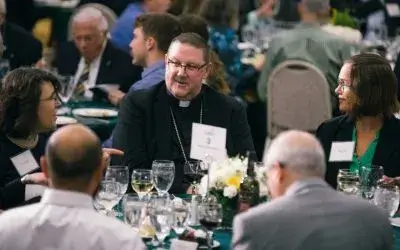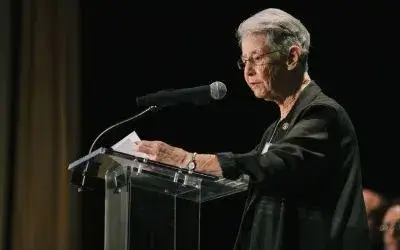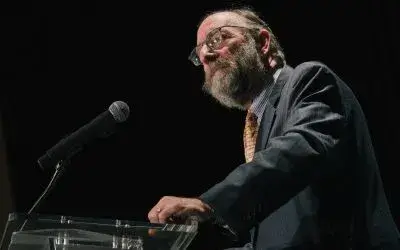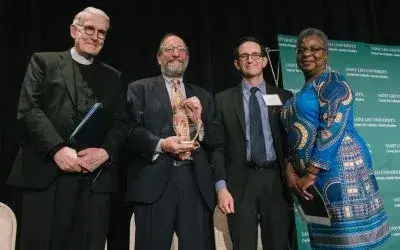Saint Leo University’s Center For Catholic-Jewish Studies Celebrates 25 Years Of Building Respect, Understanding
Rabbi David Sandmel Receives 19th Eternal Light Award for Outstanding Contributions, Lifelong Commitment To Catholic-Jewish Relations

Rabbi David Sandmel Receives 19th Eternal Light Award for Outstanding Contributions, Lifelong Commitment To Catholic-Jewish Relations

As speaker after speaker noted that it is a time when interfaith collaboration is acutely needed, the community came together on October 26, to celebrate the 25th anniversary of Saint Leo University’s Center for Catholic-Jewish Studies (CCJS) and to present the 19th Eternal Light Award to Rabbi David Fox Sandmel, PhD.
The silver anniversary event took place at the Shanna and Bryan Glazer Jewish Community Center in Tampa and celebrated the work of Saint Leo’s CCJS to build mutual respect and understanding between Catholics, Jews, and all people of goodwill.
Dinner chairs for the events were Joseph Probasco, attorney and board member of the Tampa Jewish Community Centers & Federation, and Bishop Gregory Parkes of the Catholic Diocese of St. Petersburg. Both shared their thoughts on Catholic-Jewish relations in Tampa today.
Serving as honorary chairs were Maureen Cohn and Gail Whiting.
“October 7 [the attacks by Hamas on Israel] has created something that most of us have never seen before,” Probasco said. “We’re all in here together in something that is the complete opposite of what is going on in the world.”

Parkes noted that today (October 27) Pope Francis has called people across the world to participate in a day of prayer and fasting. The pope said it would be “a day of penance to which I invite sisters and brothers of the various Christian denominations, those belonging to other religions, and all those who have at heart the cause of peace in the world, to join in as they see fit.”
“I want to assure our Jewish brothers and sisters that we stand with them,” the bishop said.
Sister Roberta Bailey, OSB, prioress of the Benedictine Sisters of Florida and a trustee of the university, gave a history of the sisters and their role in founding the university.

She introduced Dr. Matthew Tapie, director of CCJS. Rabbi David Mayan, associate director of the center, introduced guest speaker and award winner Sandmel, chair of the International Jewish Committee for Interreligious Consultations. This is the consortium of Jewish organizations that is the official Jewish dialogue partner of the Vatican, the World Council of Churches, and the Ecumenical Patriarch of the Orthodox churches.
Sandmel’s keynote address was Why Catholic-Jewish Relations Matter Today, but first commented on what is happening in the world. “The Jewish community, not only in Israel, but around the world is in deep pain,” he said. “We are traumatized. We are fearful.”
He noted the solidarity from many Catholics, “epitomized in the offer of Cardinal Pierbattista Pizzabella of Jerusalem to offer to exchange himself in place of the children held hostage.”

While most everyone in the room agreed that Jewish-Catholic relations matter, Sandmel said, many people might ask, “are they still talking about that? Didn’t they work that out already? Isn’t that mostly a European thing?”
Jews and Catholics have been talking for a long time, he noted. “In 2025 (two years and two days from this evening) we will observe the 60th anniversary of Nostra Aetate and over those 60 years, there has been great, I would say monumental, progress, achievement, and coming together.”
He noted that there still is much to be done, especially to eliminate anti-Jewish images and rhetoric in Catholic teaching and preaching. There are negative images of Judaism that became deeply imbedded in Christian culture over two millennia and those are continually being recycled, Sandmel said. “The only solution to the challenge is to raise awareness and education.”
Sandmel noted that he participated in the recent international conference in Rome, New Documents from the Pontificate of Pope Pius XII and their Meaning for Jewish-Christian Relations: A Dialogue between Historians and Theologians, of which Saint Leo’s Center for Catholic-Jewish Studies was an organizer. Pope Francis opened millions of documents pertaining to the pontificate of Pope Pius XII (1939-1958), before, during, and after World War II and the Holocaust.
“The documents examined so far, however, have provided new information about the heroic efforts of some Catholics to save Jews, but also evidence of what can only be described as moral failure,” Sandmel said. “We should not be afraid of history – and the [Catholic] Church should be commended for enabling and supporting this research.”
Sandmel argued that Anti-Christian actions in Israel also must be addressed. A particularly troubling phenomenon over the past few years has occurred in Israel, where there has been a significant and sickening increasing anti-Jewish vandalism against Christian, including Catholic, institutions — arson at the Church of the Multiplication in the Galilee, vandalism at the Church of the Dormition in Jerusalem, and the recent desecration of an Anglican cemetery, these are just a few examples, he said. “And there has been physical violence as well, including a spate of incidents in which haredi, ultra-orthodox Jews, spit at Christians or worse.
“Some of this is attributable to the rise in national rhetoric and fervor in Israeli politics,” Sandmel continued.
He said that one factor is that with the founding of the State of Israeli 1948, Jews, for the first time in almost 2000 years, found themselves wielding political power over religious and ethnic minorities, including Christians.
Sandmel also noted that there is work to be done on the Jewish side as well. Both Catholics and Jews must be educated about each other and work to build bridges.
“Finally, Jewish-Catholic relations matter because Jews and Catholics share the values that are fundamental to our shared scripture,” Sandmel said. “To paraphrase Dabru Emet: Jews and Catholics must work together for justice and peace. Jews and Catholics, each in their own way, recognize the unredeemed state of the world as reflected in the persistence of persecution, poverty, and human degradation, and misery. Although justice and peace are finally God’s, our joint efforts, together with those of other faith communities, will help bring the kingdom of God for which both traditions long. Separately and together, we must work to bring justice and peace to our world.”
The Catholic response was presented by Father Dennis McManus, a consultant for Jewish Affairs for the U.S. Conference of Catholic Bishops. “We are all delighted for you,” McManus told his friend Sandmel. “Your life of service has shone a light on what all Catholic-Jewish relationships should be.”
McManus shared how the two men work together to stop issues among their faiths and traditions from becoming larger problems, even calling each other in the middle of the night, to discuss concerns.

Tapie presented Sandmel with the 19th Eternal Light Award in recognition of his dedication, outstanding contributions, and lifelong commitment to the cause of Catholic-Jewish relations.
“Let’s continue to support this organization [Center for Catholic-Jewish Studies]” Sandmel said in his acceptance, and he encouraged everyone to continue to build friendships.
History of Saint Leo’s CCJS
The importance of the interchange of ideas and dialogue among Catholics and Jews prompted the formation of Saint Leo University’s Center for Catholic-Jewish Studies in 1998. Rabbi A. James Rudin said he noted at that time that Florida had an increasing population of Jews and Catholics, and that dynamic demographic trend was likely to continue. “There was no Christian-Jewish academic center south of Baltimore at that time,” he said.
Rudin met with the then-Saint Leo College President Arthur Kirk Jr., who liked the rabbi’s proposal of creating an interreligious center on campus. Kirk, Rudin, and Bruce M. Ramer, then-president of the American Jewish Committee, signed a joint statement establishing CCJS.
As the college grew and became a university, the late Bishop Emeritus John J. Nevins of the Catholic Diocese of Venice (FL); and now Bishop Emeritus Robert Lynch of the Diocese of St. Petersburg (FL) became co-founders of CCJS. These leaders recognized the need in the state for an academic center devoted to the biblical and theological study of Catholic-Jewish relations and interreligious dialogue, as emphasized by the Second Vatican Council.
Today, the CCJS is a leading academic center for the study of Catholic-Jewish relations. While it started as a stand-alone, lay-driven- and financed project at Saint Leo, it became fully integrated into the university in 2013.
TO MAKE A DONATION
Visit https://your.saintleo.edu/donate/areas-of-support/special-projects/ccjs-gift-fund.